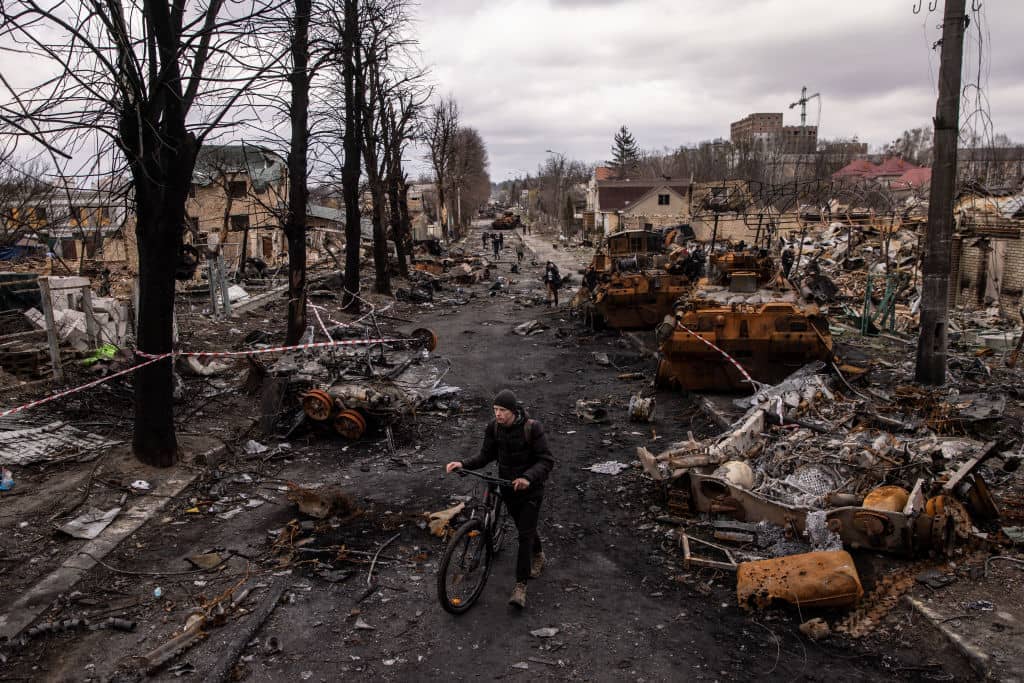So much had been written about the Russian armed forces’ modernisation and improvement over the last decade that that it was widely believed that the Russians possessed one of the largest and most powerful armies in the world until a few weeks ago. The army might not be on par with the US or China, but it was certainly capable of conquering a military minnow like Ukraine – or so the logic went.
The six weeks of war in Ukraine – which have seen Russian forces fail to take Kyiv and fall back elsewhere – has dented the army’s reputation. And now it seems that the Russian military may be running out of options in the rest of the country too.
There is growing speculation that following the Battle of Kyiv the Russians are now going to consolidate their forces in the east and south to restart major offensives. This could include surrounding Ukrainian forces in the Donbas and or even, as one general hypothesised on CNN, a large thrust to seize the strategically located Ukrainian city of Dnipro.
Rushing Russian soldiers back into the war would be a sign of the panic engulfing Putin’s leadership and represent a huge risk for the Kremlin
The problem is that this would rely on a Russian army that does not seem to exist. Any force able to launch major operations in the east to advance rapidly through Ukrainian positions and seize major Ukrainian cities would need to be capable of quickly rebuilding and resupplying defeated units, learning a great deal from its earlier mistakes and mastering complex operations. The Russian army has struggled mightily with all of these things so far.
Instead of being able to successfully launch major offensives in the east and the south, the Russian army will probably do what it has done since the campaign started: struggle to maintain its force levels, struggle with logistics, and make smaller incremental gains in some areas while being pushed back in others. This is first and foremost because the Russian army that went into Ukraine was too small, and the rest of the Russian army does not possess the kind of troops that the leadership trusts to actually make a difference.
Far from being particularly large, the Russian army is actually only a medium sized force with a relatively modest element that is considered combat effective. Russia invaded Ukraine with somewhere between 190,000 and 200,000 soldiers, and that force was considered to contain about 75 per cent of all the decent combat effective units in the army.
So far these 75 per cent of the best troops in the Russian army have struggled. They were defeated around Kyiv and forced into a hasty retreat after suffering high casualties and littering much of northern Ukraine with their abandoned or destroyed equipment. In the south and east, they have also been mostly static for three weeks now, making incremental gains towards Izyum in the Donbas while actually being forced back in the far southwest towards Kherson.
If the Russian army was in a better state, Putin could draw from troops outside Ukraine to come to the aid of his damaged invasion force. But the opposite seems to be the case. Except for some neo-Nazi mercenaries and a few new units, the Russian leadership instead appears to want to rely on the redeployment of units that lost the Battle of Kyiv to help bolster Russian forces elsewhere.
This is, by any normal military standard, nuts. These soldiers have experienced six weeks of combat, seen many of their fellow troops killed, and come to fear the Ukrainian forces. They need a rest first and foremost before being re-equipped and transported to a new battle area. This process would normally take weeks for an efficient and well-organised army – for the Russians it could well be a logistical nightmare.
Trying to rush Russian soldiers back into this gruesome war quickly would be a sign both of the panic engulfing Putin’s leadership and represent a huge risk for the Kremlin. There are already stories (some involving elite formations such as paratroopers) of soldiers in the Russian army refusing to deploy into Ukraine. Any troops that are redeployed could well be close to breaking down entirely. Human beings can only take the strain of war for so long, and a defeated army takes the strain less well.
This highlights the problem with Russia’s small army. It never had enough troops to take all of Ukraine. It could have enough troops to take parts of the south and east, but will then have no good units left to try and hold these areas. If Russia is to fight a longer war, it will have to do it after it has burned through this original invasion force. This will require the Russian state to raise, train and equip an entirely new army—one that will have to include a large number of conscripts. That will challenge Russian society’s commitment to the war, completely demolish the Russian state’s lie that this is a successful war to liberate Russians and de-Nazify Ukraine, and test the country’s already creaking and unproductive economy.
The basic problem that the Russians face in Ukraine is not that it is a big power, it’s that its army is too small and has too few soldiers that the Russian government trusts to actually fight. It seems the Russian army could be in worse shape that many imagined.






Comments